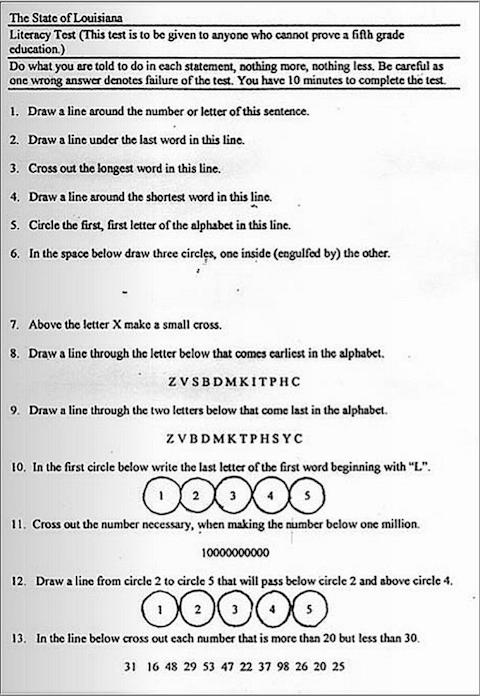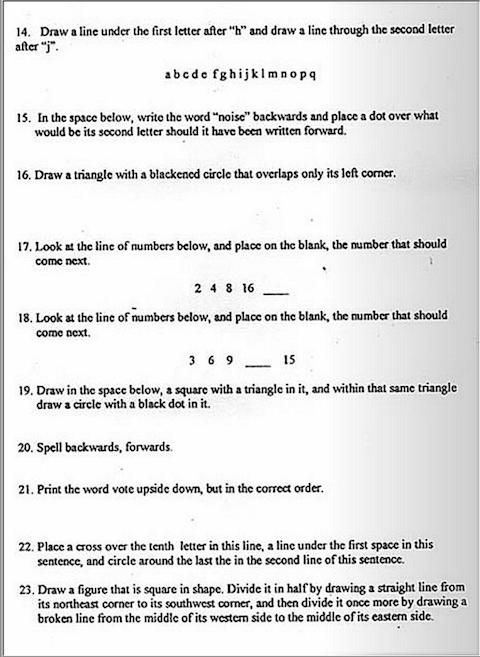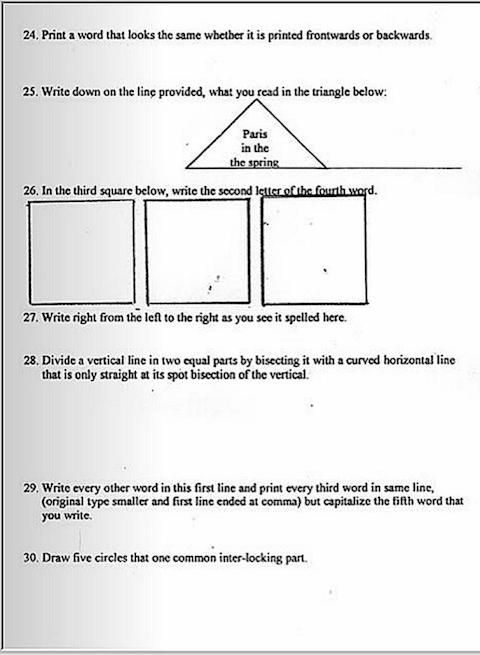This summer, we revisited a literacy test from the Jim Crow South. Given predominantly to African-Americans living in Louisiana in 1964, the test consisted of 30 ambiguous questions to be answered in 10 minutes. One wrong answer, and the test-taker was denied the right to vote. It was all part of the South’s attempt to impede free and fair elections, and ensure that African-Americans had no access to politics or mechanisms of power.
How hard was the test? You can take it yourself below (see an answer key here) and find out. Just recently, the same literacy test was also administered to Harvard students — students who can, if anything, ace a standardized test — and not one passed. The questions are tricky. But even worse, if push comes to shove, the questions and answers can be interpreted in different ways by officials grading the exam. Carl Miller, a resident tutor at Harvard and a fellow at the law school, told The Daily Mail: “Louisiana’s literacy test was designed to be failed. Just like all the other literacy tests issued in the South at the time, this test was not about testing literacy at all. It was a … devious measure that the State of Louisiana used to disenfranchise people that had the wrong skin tone or belonged to the wrong social class.” (Sometimes the test was also given to poor whites.) Above, you can watch scenes from the Harvard experiment and students’ reactions.
Follow us on Facebook, Twitter and Google Plus and share intelligent media with your friends. Or better yet, sign up for our daily email and get a daily dose of Open Culture in your inbox.





“. It was all part of the South’s attempt to impede free and fair elections, and ensure that African-Americans had no access to politics or mechanisms of power.”
Lets be accurate here. it was all part of the DEMOCRATIC party’s effort. don’t blame the entire South. Jim Crow and segregation were imposed upon Southern states by the Democratic party. don’t bury the history. Republicans existed in those states as a minority party but worked to change the laws.
also don’t forget that the Democratic party worked to keep firearms out of the hands of the black community
Let’s be even more accurate Peterk: The Southern Democrats of 1964 ARE the Republicans and Tea Partiers of 2014–white,patriarchal, religious conservatives–and are precisely the people who wanted to suppress the minority vote, then and now. And they’re more than happy to keep guns (and money, and power) out of the hands of black people–generally by oppressing, silencing, or jailing as many black people as possible.
Peterk — Of course, as everyone knows, you are referring to the so-called “Southern Democrats,” who left en masse for the Republican party as soon as the Democratic leadership stood up for civil rights. There’s the history of the modern Republican party, why to this day it is a party full of bigots and morons.
You either don’t know this history (and thus are ignorant), or know it and are pretending not to (and thus are hypocritcally “burying” it yourself).
It’s a great test. I’m a southern dem.
Dan,
Serious question: Do you believe in universal suffrage? Would you think me unreasonable for believing that those who are net tax beneficiaries, functionally illiterate, wholly enumerate and demonstrably incapable of speaking without saying, “like” like a Tourette’s victim probably shouldn’t be able to vote?
Steve, I would in fact think it unreasonable of you to think that people who are functionally illiterate or not particularly articulate should not be allowed to vote. Political decisions affect these people. Why shouldn’t they be allowed to vote for the parties or candidates who make such decisions?
Very sad. Chilling.
Dan:
You note that “[i]f there’s a problem, it’s not the scope of suffrage; it’s our educational system.” I tend to agree with that point.
It is worth remembering that nearly all of the students you mention are graduates of public elementary schools which are controlled, to a large extent, by public sector employee unions. Any time a virtual monopoly exists for a product or service, there is a significant risk that the quality of that product or service will be degraded.
When these kids enter college, they then encounter — particularly in the humanities — a system that leans more toward indoctrination than education. It is ironic that these institutions which preach “diversity” when it comes to race, are virtually one-dimensional when it comes to the viewpoints of their faculty staff.
What’s even more surprising, is that there was SOMEONE in Louisiana who was clever enough to write questions that even Harvard grads couldn’t answer! I’d be curious if the question-writer had an answer-key…
If Harvard students can’t figure this out then they don’t belong at harvard.
Chris Palermo :
‘Chilling’ was the very word that came to mind as I went through the test.
Hey Tony, what’s your answer for number 6? 21? How about 28 or 30? What is the difference between “drawing a line around” something and “circling” something? Can you even parse question 29? I don’t think you’re half as smart as you think you are.
Yay!! I’m Canadian!!
Whoever does not pass this test should not be allowed to pay taxes!!!
Well at least one didn’t have to guess the number of gum balls/peanuts/pennies in a jar.….or interpret the constitution as what was done here in Alabama on top of paying a cumulative poll tax.
I don’t get it. Though they’re really stupid questions and seem more like an IQ test for children than a literacy test, and shocking to this day that these tests were given to people before they could vote. But the issue here is that everyone, including Harvard students, would not be able to answer them. I think they’re faking it. I’m not a genius, but I could answer them. Come on people, look at the questions. They’re easy to answer,
I was surprised at how crappy these students that made it into Harvard were at these questions, so I downloaded it and took it myself. I missed number 29, because I think the question was poorly written when you consider the complicated sequential nature of steps required to arrive at the desired answer. But these others, that had the students shaking their heads were indeed elementary. But for me and voting, I guess I’d have been heading home if 29 was on there for me in 1964. The only thing really unfair about this is if it were only given to specific races and not others.
Worth considering, I’m with Eric above as he challenges Dan with his serious question. I think the more we encourage and enable uneducated and disengaged people to easily vote, the more our policies are able to be purchased with money pumped into advertising.
On that note, I think we’d do well to give an upgraded version of this test to all would-be voters. While taking it, I sensed that it requires engagement of the part of the brain required to understand most laws that a person would be voting for or against. I’m not talking about x or y candidate. I’m talking about understanding the laws and constitutional changes that are passed on a general ballot. These are dangerous, liberty-threatening ballot items that are subjected to a vote among people that often possess mere anecdotal awareness.
In summary, I’m all for it taking effort and education to be able to vote. I’m encouraged by only having those voting that have taken time to educate themselves about the policy and its long and short term impact. Blind and impatient desires of a mass population will inevitably undermine an otherwise sustainable republic if the whims of an uneducated people are realized through general election ballots.
Paul’s comment above about ‘draw a line around’ vs ‘circle’ is a good point. The inconsistent use of terms that could be interpreted differently when view by a student of geometry and a layperson, seem like traps. Those areas of this test are where we have a real problem with this type of test if it isn’t equally subjected to would-be voters of all races. A line cannot be ‘drawn around something’, as a circle drawn upon request is the drawing of a known shape that will prove a person knows how to read and understand our language when it is used clearly.
Similarly, my fumble on #29 is because of how the problem didn’t clarify that it wanted me to do the every other word, THEN the every third word actions separately, or if I was expected to do them both as part of a one-part solution, as implied by their use of the word ‘and’. Also, I found a version of the test that included solutions out there and the ‘solution’ provided on that document had the 5th word in the printed line capitalized, and not the 5th word of the written line, with “written” meaning cursive and “printed” meaning none-cursive. This question seems like it was intended to significantly increase the risk of failure through ambiguity and over-complication, and would have likely been excluded if the test were to be required by all races.
Scott, you are a moron if you think this is fair. Please read the constitution and the amendments.
A considerable number of the questions have NO correct answer because they’re ambiguous, make too many assumptions, or are otherwise incompetently worded.
The test shown on this page (above)and the linked answer key do not match up, either in the number of questions (30 here, answers for 19 on the key) or the numbering of the questions(eg: #30 here, is #19 on the key; questions #14 to #24 here,are nowhere to be found on the key.)
Does anyone know if each Parrish had its own version of the test, an example of one Parrish’s being what is shown above? Or has the original, *actual*, vote-suppressing test given/used by LA in 1964, been ‘enhanced’ by someone(s)to the point of absurdity?
Has the test above, like so much else of this nature on the interwebs, been ‘added to’ by someone(s)to ramp up the shock value; by someone(s)who has taken something truly grave, something we should *all* be cringing over and remember, and turned it, instead, into something we laugh about and dismiss? Does anyone know? thanks, beth.
Harvard kids must not be very smart. That test is not THAT hard for an educated person. That said, a low % of people would pass it today.
I am baffled by those who insist this test is easy, which would imply unambiguous. Just a few examples of ambiguity:
6. There are definitely three circles. The way it reads, there could be two concentric circles with one circle outside the other two, or three concentric circles.
11. There is no way to be literally correct, as “the” in this instance is analogous to “a,” which is analogous to “one,” and crossing out any one number won’t make 1,000,000. The most correct possible answer to the request as written is to cross out 1000000, but who would do that, especially when you have so many more questions to read, and in 10 minutes?
29. Already covered in this thread.
30. This is grammatically non-sensical, so the correct answer should be no answer, but in practice could be anything the grader wanted it to be.
I love reading (and am a super fast reader), test-taking (yes, really), and logic puzzles; have two degrees; and research every issue and candidate on my ballot before voting. So, 1) I think I’m the kind of person most commenters prefer to have voting; and 2) I would very likely fail this test. Even at my reading speed, I likely couldn’t finish. Add that to the ambiguity, and it’s a guaranteed fail.
My comment on the earlier post .…
“Stephen says … | July 23, 2014 / 11:15 pm
It would be fun to administer this test to incoming Harvard undergrads or new Google employees to see how they would do.”
I believe the point of the original posters was to show how incredibly unfair the so called “jim crow” laws really were. To answer one of the questions posed above, these tests were ONLY required to be taken by non-white voters. It is fairly obvious that a person without an above average problem solving skillset would have difficulty passing this test. IF the test was rewritten without the ambiguity & trick questions, with questions dealing with current issues, history, and the way our government is supposed to work (by, of, and for the PEOPLE, for example,) and IF EVERYONE was required to take it before voting (not required to PASS it, just to take it and see our own results,) thereby (hopefully) adding a bit of humility and respect for the democratic process to each voter, it could be a positive thing. Unfortunately, we all know that an educated, independent minded popolace is the LAST THING the ‘powers that be’ want, and there is no limit to the amount of OUR money they will spend to prevent such a thing.
One other comment, to the person who stated that public school curriculums are controlled by teachers unions, that may be the most ridiculous, ignorant comment on this page. It is terribly sad that so many people have been led to believe that Teachers are wholly rsponsible for the sad state of our education system. Curriculums in this country are set by politicians. Teachers MUST adhere to state-mandated teaching programs. There are some poor teachers out there, certainly, but thete are also a great many teachers who see the job as a calling, who do an incredible job of giving our children both a decent education and a sense of self worth combined with social responsibility that is all to rare these days. Ignorant children come from ignorant parents, not bad teachers. Deal with it.
the test and the key provided do not match up, but then taking this test and voting do not match up either.….
What literacy has doing with voting? Despiccable subterfuge to keep negros from the polling stations. Same thing with“registration”. Where i live nothing like that. U.s. is a developing country.
Ah, Dan. You’d better look at the cross-tabulation of states who are net tax beneficiaries and those who vote Republican. You’ll probably weep into your beer when you figure out how many of your fellow Reds would lose their electoral rights.
(By the way, “enumerate” is what is done to specify something. “Innumerate” is the term for people who can’t identify numbers. I’m sure you made the mistake out of a desire to post without thinking, but you really should proofread.)
Second — and this is to all the people who disparage the test — did you actually do the whole thing in ten minutes? Who kept the clock? Who got to grade the answers? Any chance there was any ambiguity that might have been used against you? And what year did *you* graduate from Harvard?
The test is not meant to be passed. It may appear simple but it is tricky and believe me the goal was to fail every student who took it. For all of those people who claim they could pass it, you have already seen the video and have had time to think about it. Not like taking it cold. Anyway the test is a set up — intended to fail the student. So the answer key probably won’t have what the average person would answer in ten minutes of time. BTW ten minutes means you only have 20 seconds per question.
I have two master’s degrees. This is the dumbest freakin test I’ve ever seen. Its obviously meant to set people up to fail.
I had to take this test in school today, and let me tell you… for the people who think this test is “easy” that you are absolutely stupid in the mind. Keep in mind that this wasn’t just for black people, this was for some uneducated white people too, and remember, this was in 1950–1960. So they didn’t have all this knowledge, even some of the smartest people there weren’t as smart as they passed off to be. So this was really hard for them. [openculture facts!] Know that black people didn’t get the same education that we do these days.
Remember! No spamming or Advertising!
who cares there was racism everywhere and there still is. by both republicans and democrats!!!!!!!!!!!!
i am a bit late to the par-tay!!!!!
u clearly have gone harvard. i am vauguely upset
elaborate! u bad grammer boy/……